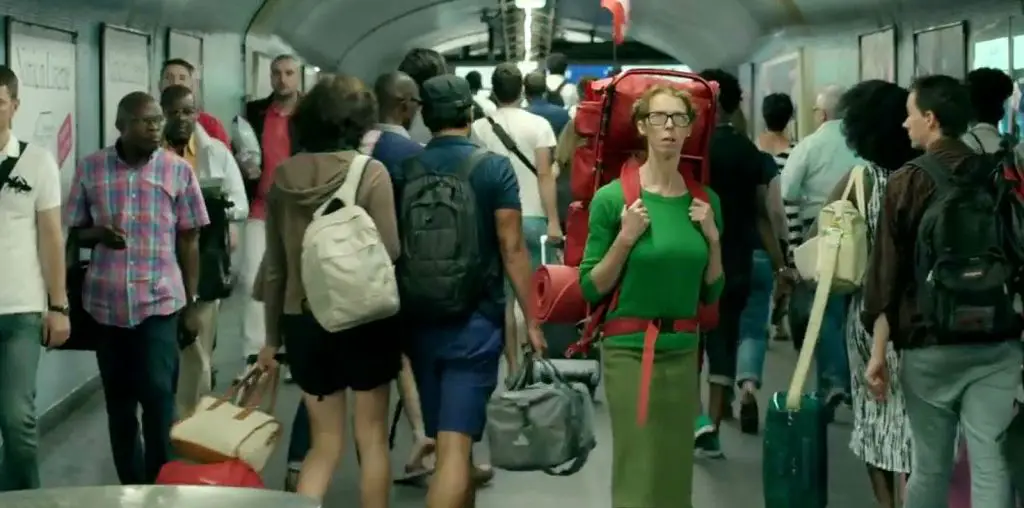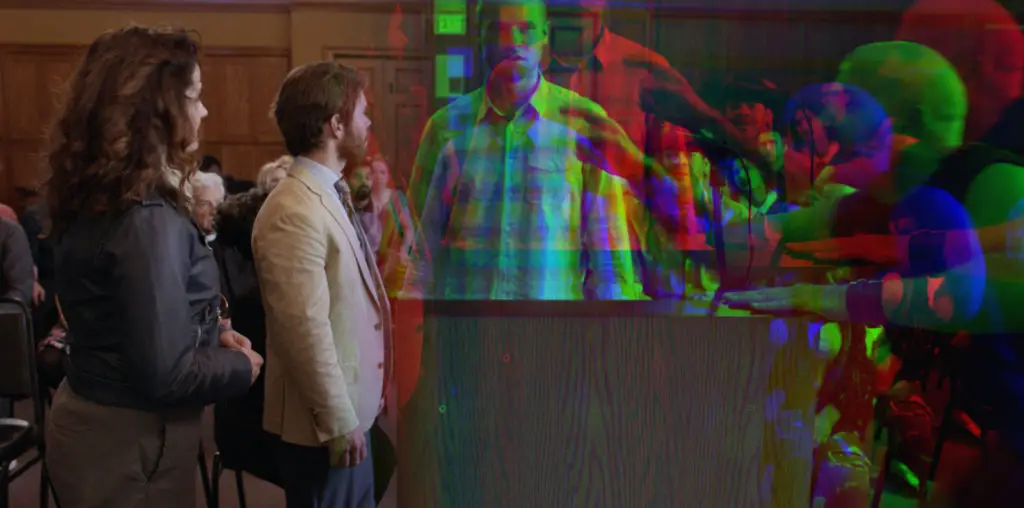
In the past half-century, there have been four adaptations of George Orwell’s landmark novel “1984.” Strangely, none of them is currently available for commercial DVD sale in the United States. Only one was ever released on American home video: the fourth version, made in 1984 and starring John Hurt as the doomed Winston Smith and Richard Burton as the treacherous O’Brien. You can easily find used videos of this version on eBay – and this version is worth tracking down.
What may have been the worst version was the first: a 1953 American television production which appeared on the popular “Studio One.” While “Studio One” was celebrated for high quality live television dramas, the idea of having Eddie Albert as Winston Smith and Lorne Greene as O’Brien can give one pause to shudder. I am unaware of this version being available on bootleg video and I can’t be certain whether a kinescope even exists. There is an unintentionally funny publicity photo with Eddie Albert in costume as Winston; he is wearing overalls which make him look like one of the oddball hicks he would later encounter on “Green Acres.” (Pity that Eva Gabor was not cast as Julia!)
Both the second and third version of “1984” will be the focus of this week’s Bootleg Files. Neither production has ever seen an official American home video release, but both can easily be obtained via bootleg channels. One of them is worth seeking out, while the other leaves a lot to be desired.
The superior of the two is the 1954 live BBC-TV production starring a then-unknown Peter Cushing as Winston Smith. According to the BBC, the production was uncommonly expensive for its time with 22 sets and a live orchestra playing the specially commissioned score. The production also included a level of violence which seems very tame today but which horrified many people 50 years ago (the scene where Winston is tortured with rats, which were actually harmless white rats painted black with shoe polish). The BBC production created a minor brouhaha when self-appointed public advocates raised loud complaints that somehow found their way into House of Commons debates. However, the production also had phenomenal ratings and a second live telecast was shown a few days later. In an uncommonly prescient move, this production was recorded for posterity (many live BBC broadcasts were never recorded and are thus lost to us today).
Cushing’s gaunt presence and halting manner of speech made him a perfect Winston. He perfectly embodied the suffering he felt as he labored joyously within Big Brother’s crushing propaganda machinery. The subtle nature of his magnificent performance is wildly at odds against the more-familiar hammy Hammer monster flicks for which he is best known. Cushing is beautifully paired against Yvonne Mitchell, a vivacious actress who carefully downplays her personality here as Julia, Winston’s would-be partner in forbidden love and failed rebellion. Their scenes of furtive, illegal romance have an aching, almost pathetic quality to them. Their eventual betrayal and humiliation by Andre Morell’s icily efficient O’Brien is a shattering experience.
The popularity of the Orwell book (especially in the midst of the Cold War hysteria) enabled a motion picture to be made of the text. Unfortunately, the BBC cast was not requested to repeat their roles: Cushing, Mitchell and Morell were unknown in the American market and Columbia Pictures, which had a role in the film adaptation, wanted recognized names to ensure box office returns.
As a result, the 1956 film version of “1984” brought in two American stars as the doomed lovers: Edmond O’Brien (fresh off his Oscar win in “The Barefoot Contessa”) as Winston and Jan Sterling (an Oscar nominee for “The High and the Mighty”) as Julia. Michael Redgrave, a British actor who was very familiar to American audiences, was cast as their betrayer with the newly moniker of O’Connor (clearly designed to avoid confusion with Edmond O’Brien). The only carryover from the BBC version was Donald Pleasence in a small role as one of Winsto’s colleagues at Big Brother’s propaganda plant.
The 1956 film is not an easy production to watch and it is even less pleasant to hear. O’Brien’s gruff New York accent and Sterling’s dullish Hollwyood-scrubbed voice were vocally at odds with the all-British cast around them. Rather than coming across like two lowly and faceless workers, they sound like American tourists wandering about London. O’Brien’s burly presence was also at odds with the Orwell character. Whereas Cushing (and John Hurt in the film remake) physically appeared to be starving at both an intellectual and culinary level (in keeping with the book’s descriptions of inadequate food supplies), the heavyweight O’Brien looks like he was living in McDonald’s. Sterling’s glamorous presence is also a deviation from Orwell’s concept of Julia. While Yvonne Mitchell downplayed her beauty, Sterling was clearly not willing to go on-screen looking like a plain Jane. Sterling looks wonderful, though completely out of place.
As for Michael Redgrave, he sought to prove the old adage that there are no small parts but only small actors. His oversized, hammy performance makes him more of a comic villain rather than genuine menace. Clearly he did not learn his lessons from the misguided “Mourning Becomes Electra” (featured in last week’s column).
Strangely, this version of “1984” was successful with audiences (anything even vaguely anti-Commie was a winner back then). Columbia’s exploitative ad campaign helped a lot, with tag lines like “Will Ecstasy Be a Crime…In the Terrifying World of the Future?” and “SEX OUTLAWED…the the terrifying world of tomorrow!” Columbia even re-released the film in 1961, long after O’Brien and Sterling had any box office appeal.
So where did the two “1984” productions vanish to? The BBC version was never telecast in the United States and it only began to appear on this side of the Atlantic during the past few years thanks to bootlegs of commercial British videos. As for the 1956 version, it was a staple on U.S. television for some time but then it was pulled out of release. It is not certain why this happened, although the most likely problem clearing the rights from the Orwell estate for home video release.
Twenty years after the real 1984, people are still reading Orwell and still watching Big Brother watch Winston and Julia. Now if we can only find Eddie Albert revolting against Big Brother!
____________________________________________________________
IMPORTANT NOTICE: The unauthorized duplication and distribution of copyright-protected material is not widely appreciated by the entertainment industry, and on occasion law enforcement personnel help boost their arrest quotas by collaring cheery cinephiles engaged in such activities. So if you are going to copy and sell bootleg videos, a word to the wise: don’t get caught. The purchase and ownership of bootleg videos, however, is perfectly legal and we think that’s just peachy! This column was brought to you by Phil Hall, a contributing editor at Film Threat and the man who knows where to get the good stuff…on video, that is.
Discuss The Bootleg Files in Back Talk>>>


I remember seeing the film version as a kid (12-yrs-old), and even then thought it was a “hokey” production but have always wanted to obtain it for my library.
I am a total computer illiterate and haven’t a clue as how the thing could be obtained.
I have the last release (legally purchased, of course)but would lie the other as well. As I don’t engage in illegal downloads, I need some advice.
Thank you
Teddy